Charles E W Bean, Diaries, AWM38 3DRL 606/114/1 - June 1918 - Part 1
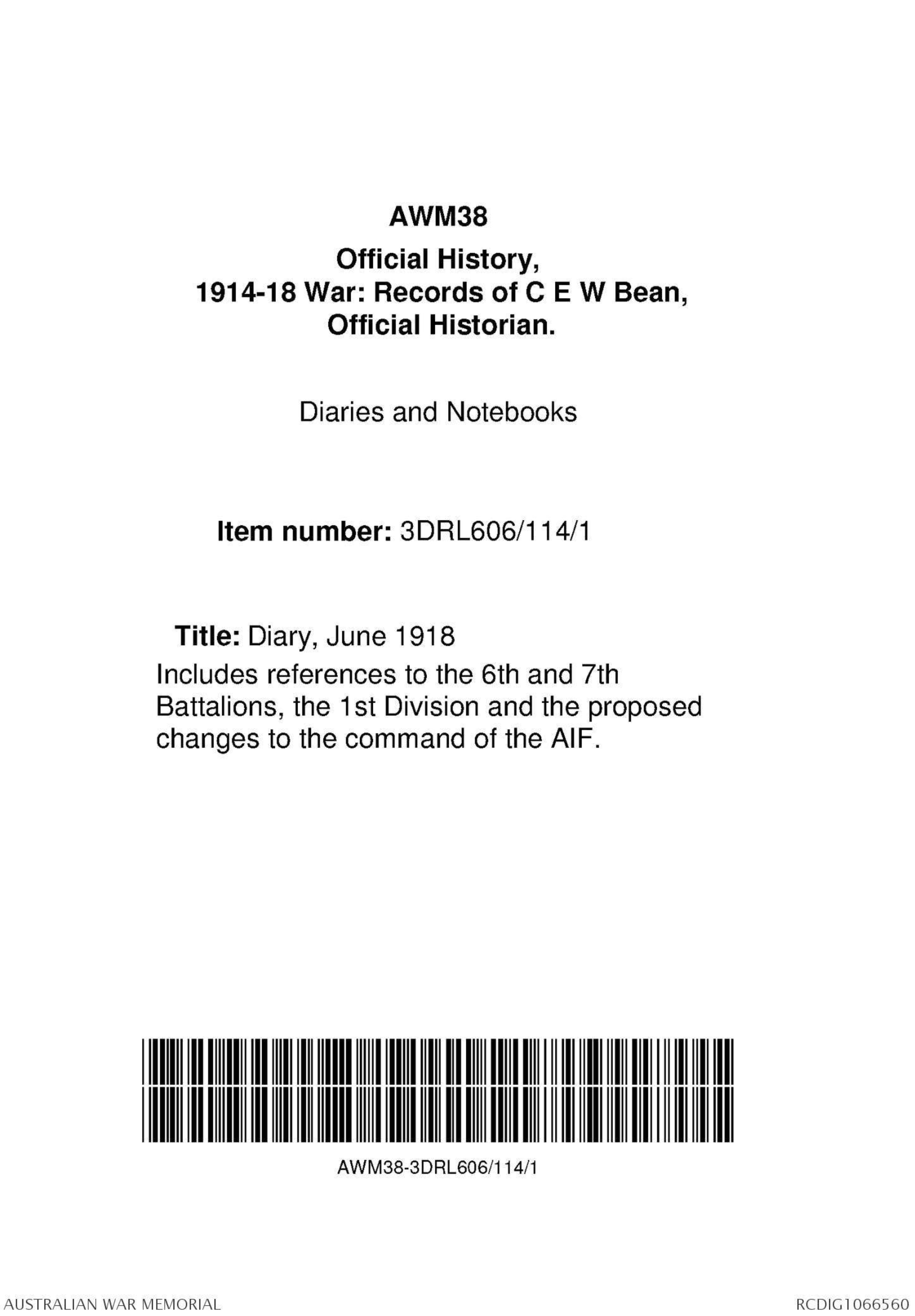
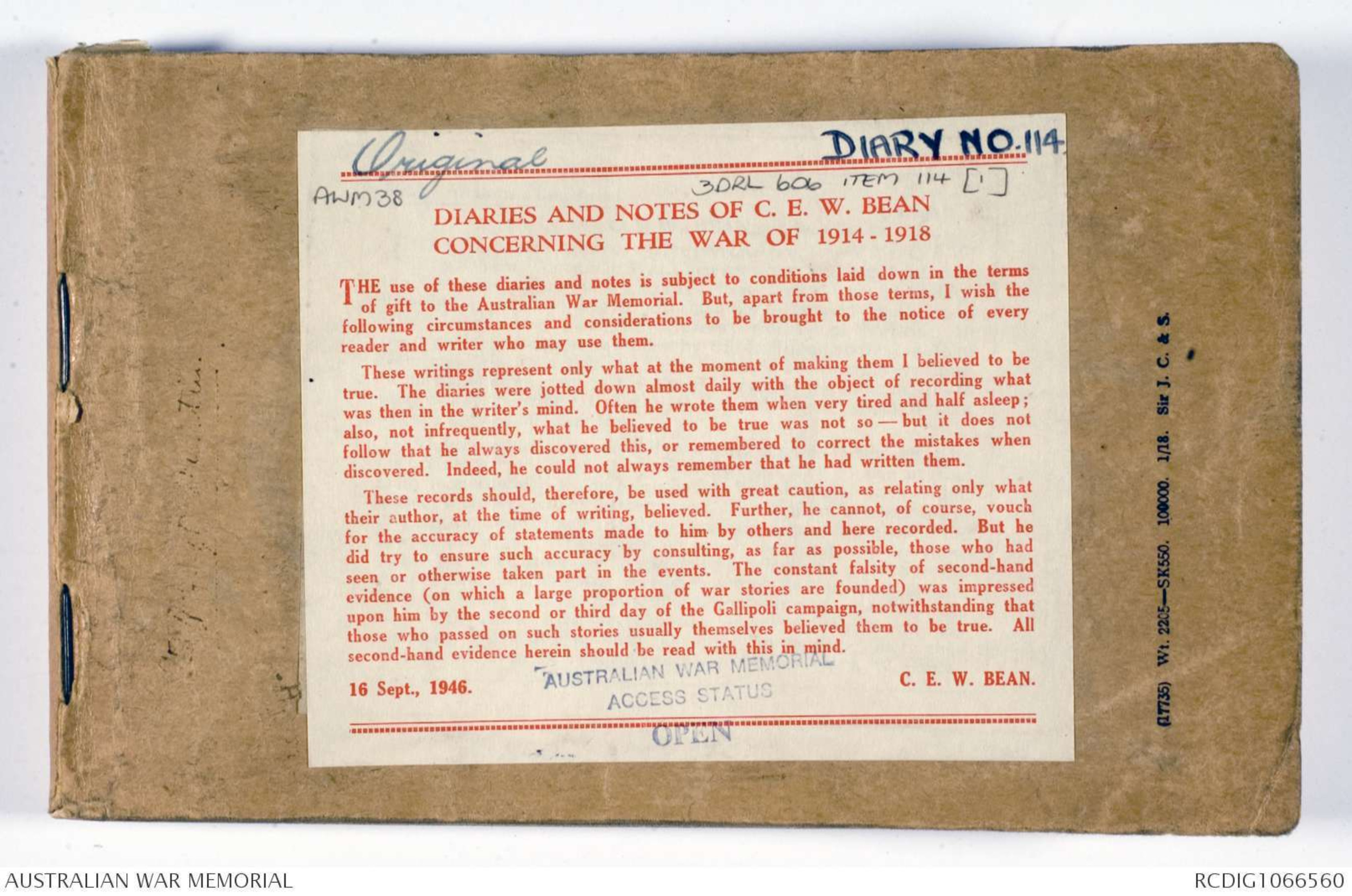
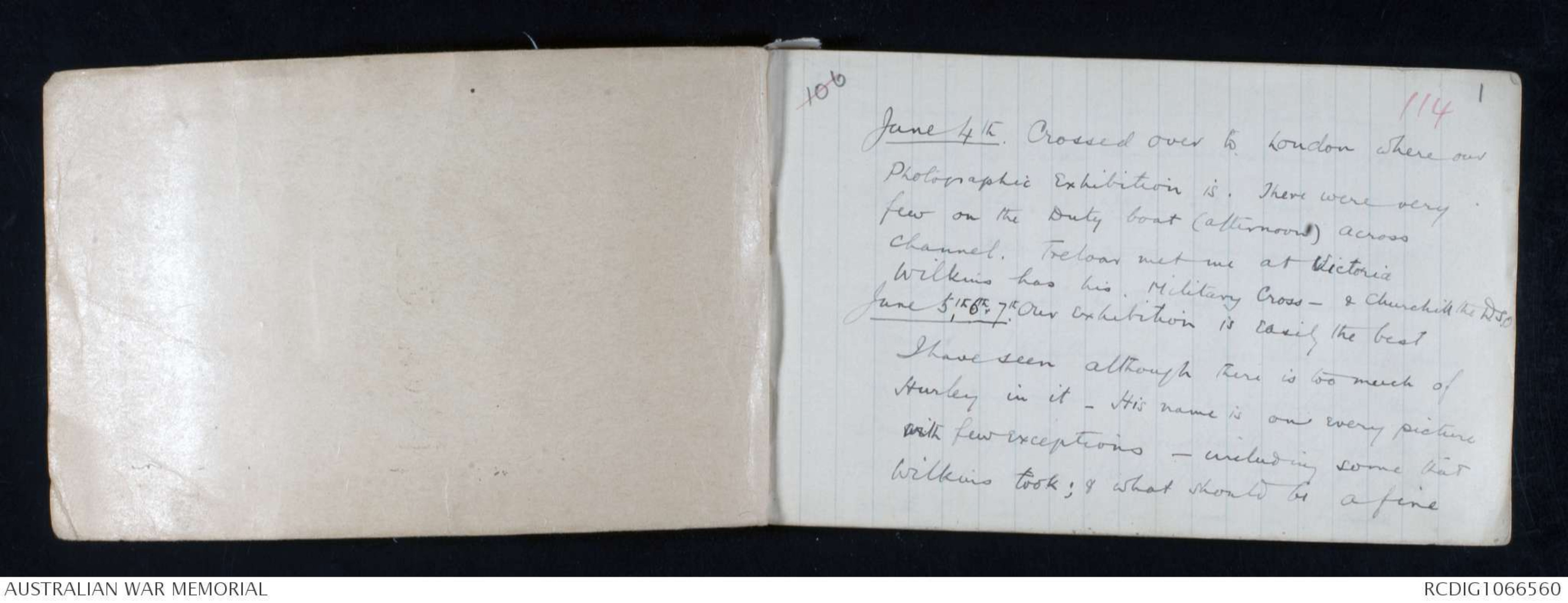
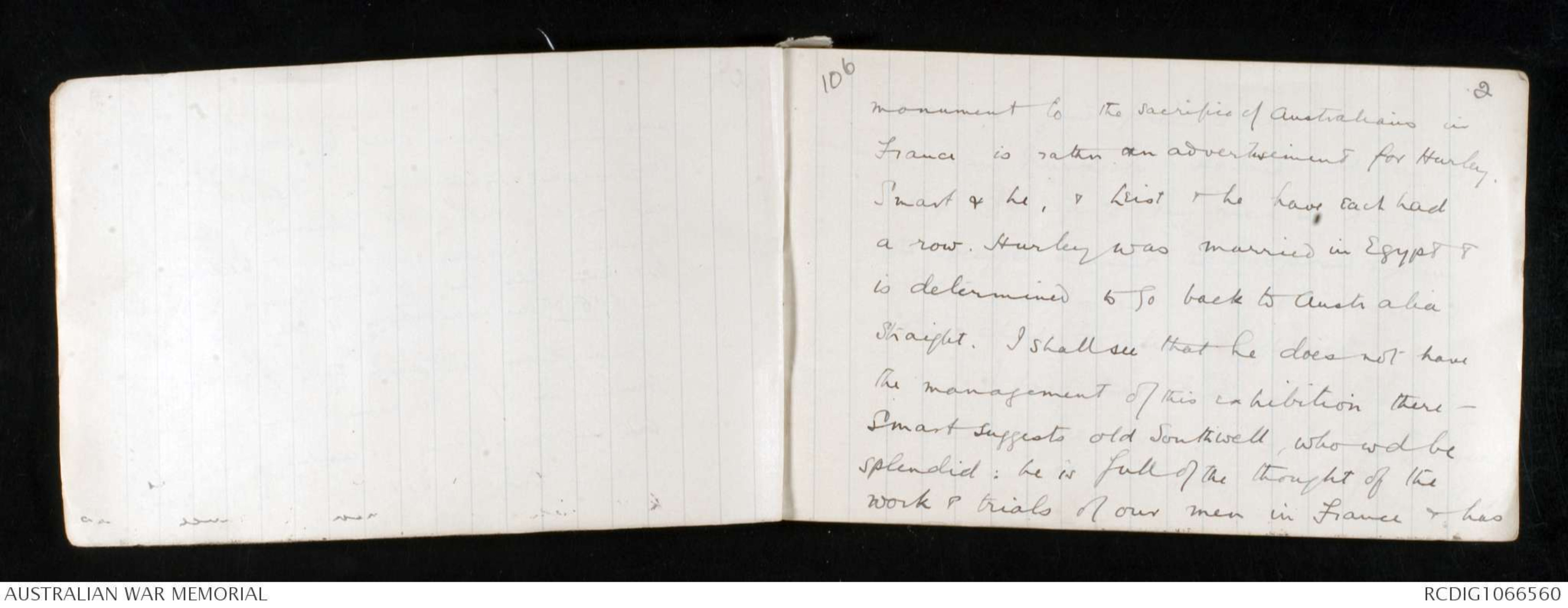
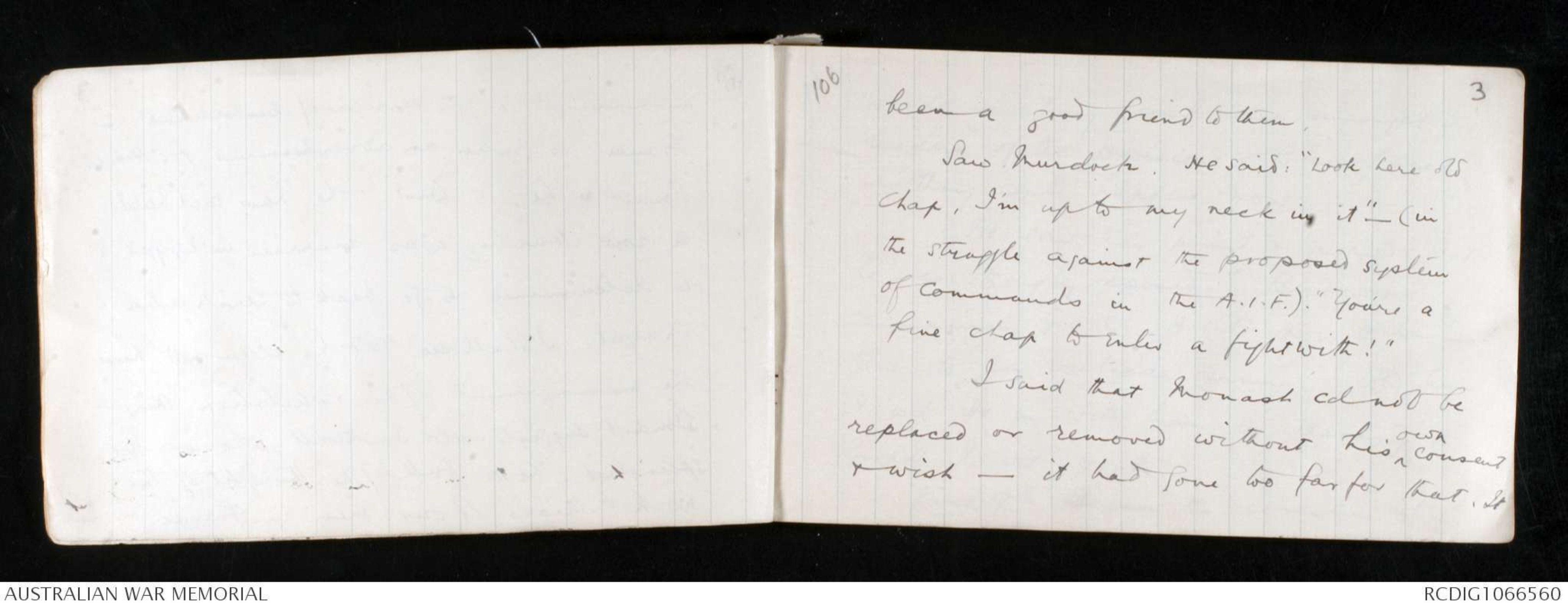
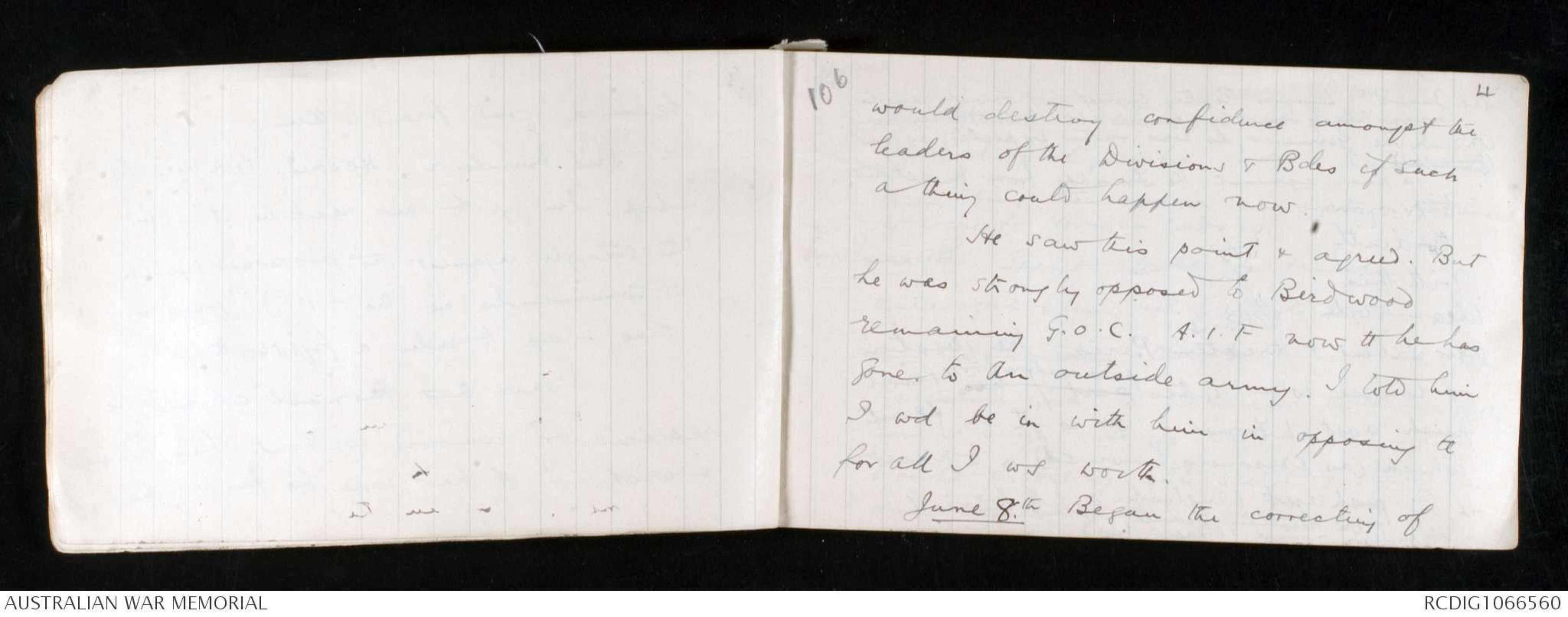
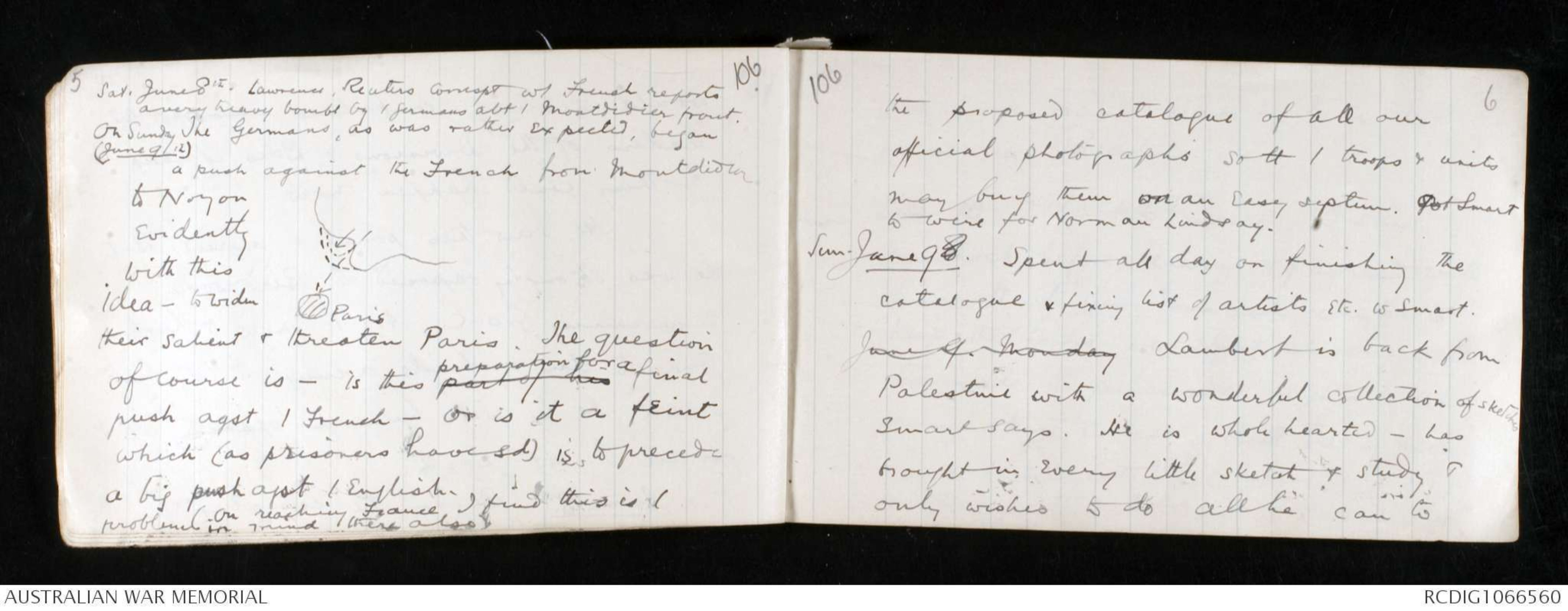
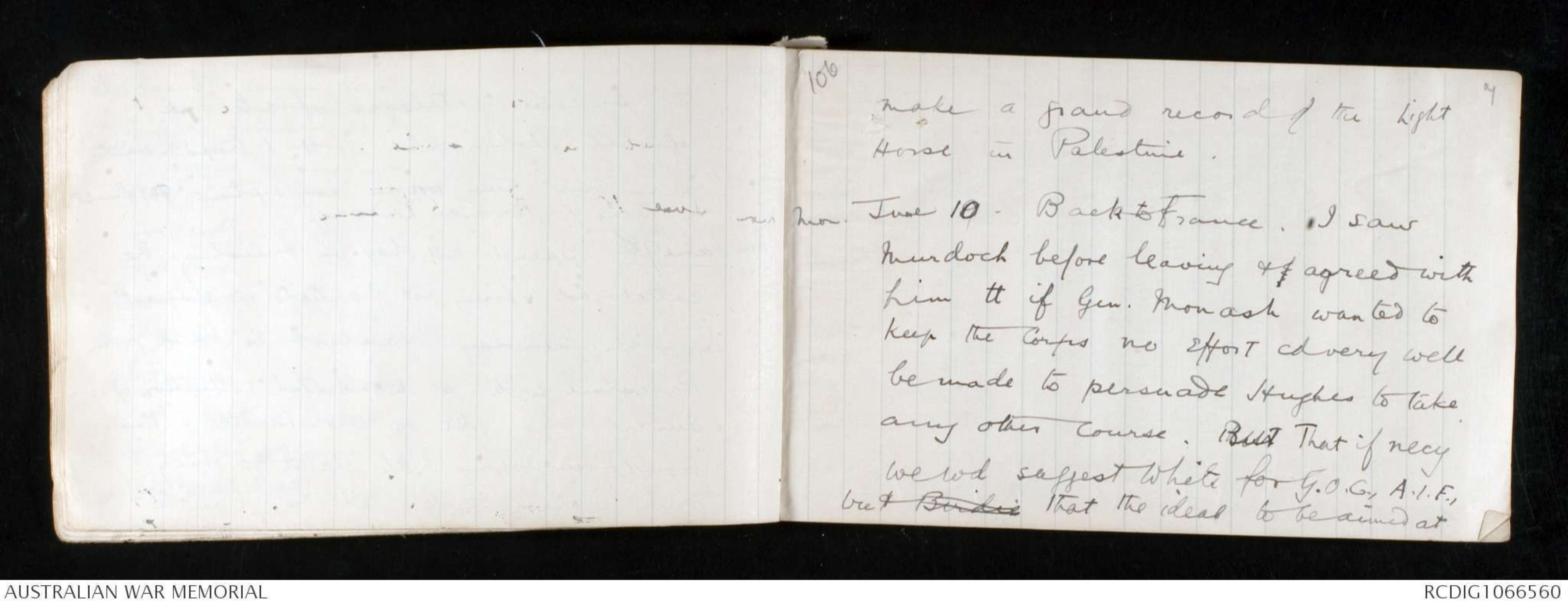
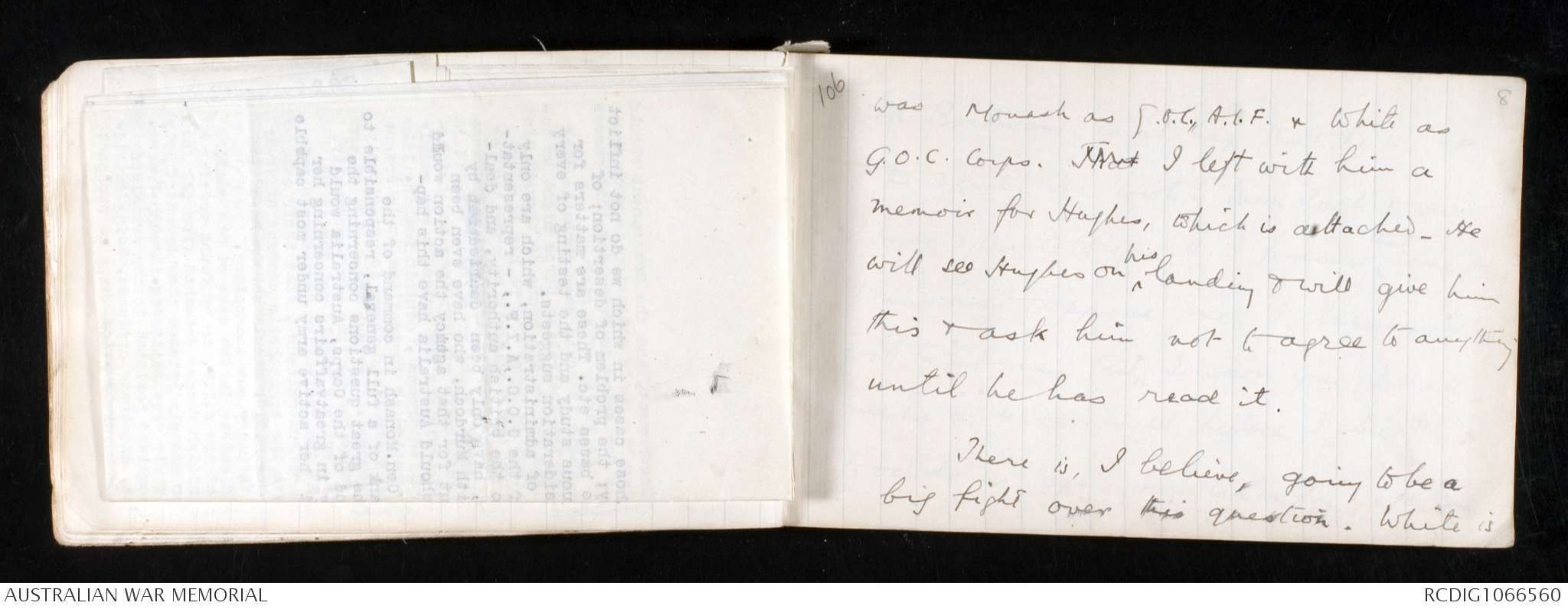
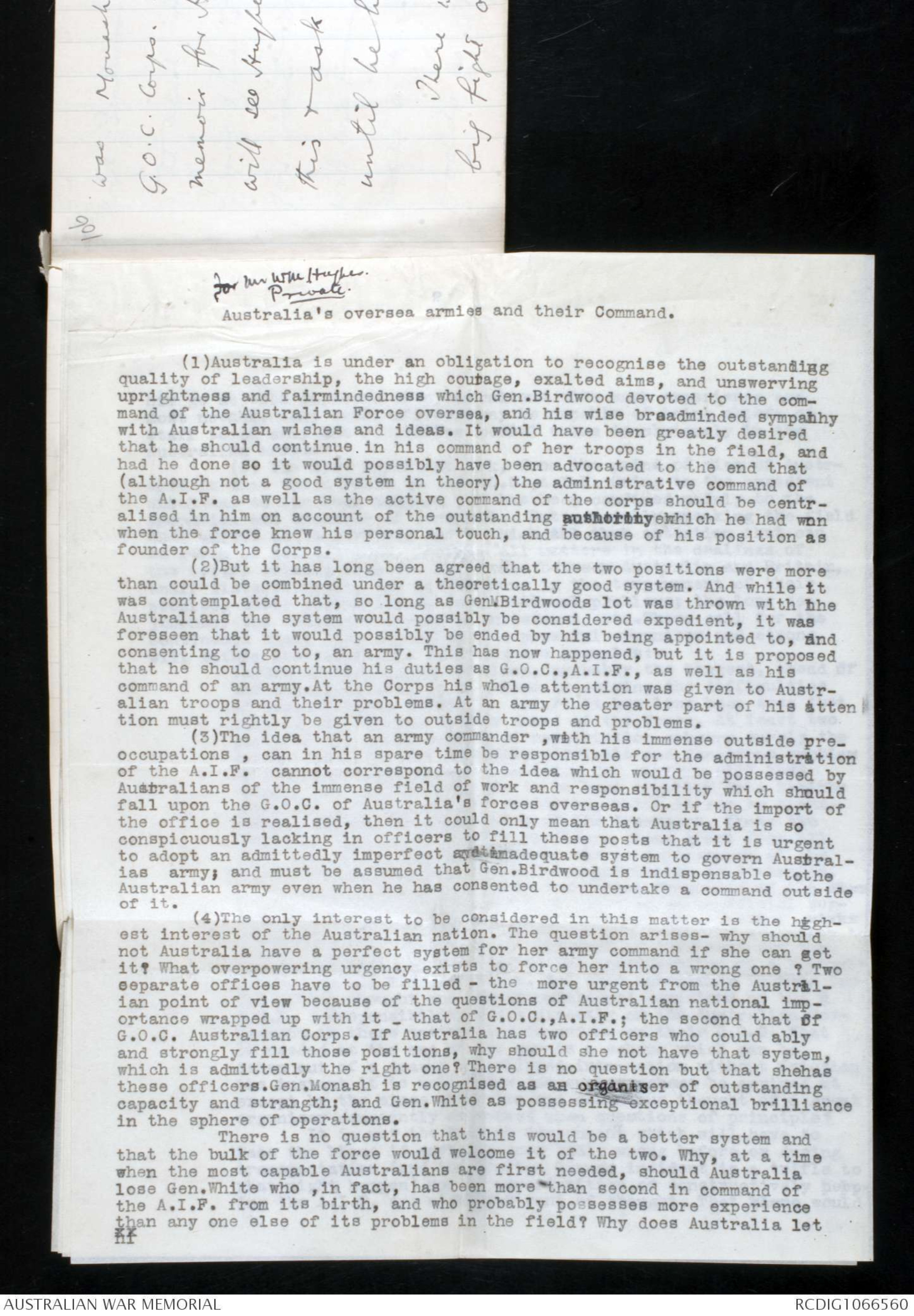
AWM
Official History
1914-18 War: Records of C E W Bean,
Official Historian.
Diaries and Notebooks
Item number: 3DRL606/114/1
Title: Diary, June 1918
Includes references to the 6th and 7th
Battalions, the 1st Division and the proposed
changes to the command of the AIF.
AWM38-3DRL606/114/1
Original DIARY NO. 114
AWM38 3DRL 606 ITEM 114 [1]
DIARIES AND NOTES OF C. E. W. BEAN
CONCERNING THE WAR OF 1914 - 1918
The use of these diaries and notes is subject to conditions laid down in the terms
of gift to the Australian War Memorial. But, apart from these terms, I wish the
following circumstances and considerations to be brought to the notice of every
reader and writer who may use them.
These writings represent only what at the moment of making I believed to be
true. The diaries were jotted down almost daily with the object of recording what
was then in the writer's mind. Often he wrote them very tired and half asleep;
also, not infrequently, what he believed to be true was not so - but it does not
follow that he always discovered this, or remembered to correct the mistakes when
discovered. Indeed, he could not always remember that he had written them.
These records should, therefore, be used with great caution, as relating only what
their author, at the time of writing, believed. Further, he cannot, of course, vouch
for the accuracy of statements made to him by others and here recorded. But he
did try to ensure such accuracy by consulting, as far as possible, those who had
seen or otherwise taken part in the events. The constant falsity of second-hand
evidence (on which a large proportion of war stories are founded) was impressed
upon him by the second or third day of the Gallipoli campaign, notwithstanding that
those who passed on such stories usually themselves believed them to be true. All
second-hand evidence herein should be read with this in mind.
16 Sept., 1946. C.E.W. BEAN
AUSTRALIAN WAR MEMORIAL
ACCESS STATUS
OPEN
[*(17735) Wt. 2205—SK550. 100000. 1/18. Sir J. C. & S.*]
106 114 1
June 4th Crossed over to London where our
photographic exhibition is. There were very
few on the Duty boat (afternoon) across
channel. Treloar met me at Victoria
Wilkins has his. Military Cross – & Churchill the DSO
June 5th, 6th, 7th. Our exhibition is easily the best
I have seen although there is too much of
Hurley in it _ His name is on every picture
with few exceptions — including some that
Wilkins took; & what should be a fine
106 2
monument to the sacrifice of Australians in
France is rather an advertisement for Hurley.
Smart & he, & Leist & he have each had
a row. Hurley was married in Egypt &
is determined to go back to Australia
Straight. I shall see that he does not have
the management of this exhibition there –
Smart suggests old Southwell who wd be
splendid: he is full of the thought of the
work & trials of our men in France & has
106 3
been a good friend to them.
Saw Murdoch. He said: "Look here old
Chap, I'm up to my neck in it" — (in
the struggle against the proposed system
of commands in the A.I.F.). "You're a
fine chap to enter a fight with!"
I said that Monash cd not be
replaced or removed without his ^own consent
& wish — it had gone too far for that. It
106 4
would destroy confidence amongst the
leaders of the Division & Bdes if such
a thing could happen now.
He saw this point & agreed. But
he was strongly opposed to Birdwood
remaining G.O.C. A.I.F now tt he has
gone to an outside army. I told him
I wd be in with him in opposing tt
for all I ws worth.
June 8.th Began the correcting of
5 106
Sat. June 8th. Lawrence, Reuters correspt w / French reports
a very heavy bombt by / Germans abt / Montdidier front.
On Sunday The Germans, as was rather expected, began
(June 9/12)
a push against the French from Montdidier
to Noyon Hand drawn diagram - see original document
evidently
with this idea
– to widen
their salient & threaten Paris. The question
of course is – is this part of his preparation for a final
push agst / French – or is it a feint
which (as prisoners have sd) is to precede
a big push agst / English.
(On reaching France I find this is /
problem in mind there also)
106 6
the proposed catalogue of all our
official photographs so tt / troops & units
may buy them on an easy septum. Got Smart
to wire for Norman Lindsay.
Sun. June 9 X. Spent all day on finishing the
catalogue & fixing list of artists etc. w Smart.June 9. Monday Lambert is back from
Palestine with a wonderful collection of sketches
Smart says. He is whole hearted – has
brought in every little sketch & study &
only wishes to do all he can to
106 7
make a grand record of the Light
Horse in Palestine.
Mon. June 10. Back to France. I saw
Murdoch before leaving & I agreed with
him tt if Gen. Monash wanted to
keep the Corps no effort cd very well
be made to persuade Hughes to take
any other course. But That if necy
we wd suggest White for G.O.C, A.I.F,
but Birdie that the ideal to be aimed at
106 8
was Monash as G.O.C., A.I.F. & White as
G.O.C. Corps. Jock I left with him a
memoir for Hughes, which is attached _ He
will see Hughes on ^his landing & will give him
this & ask him not to agree to anything
until he has read it.
There is, I believe, going to be a
big fight over this question. White is
[*106 was Monash
G.O.C. Corps.
memoir for
will see Hughes
this & ask
until he
There
big fight*]
for Mr W M Hughes.
Private
Australia's oversea armies and their Command.
(1) Australia is under an obligation to recognise the outstandigg
quality of leadership, the high courage, exalted aims, and unswerving
uprightness and fairmindedness which Gen. Birdwood devoted to the command
of the Australian Force oversea, and his wise broadminded sympahhy
with Australian wishes and ideas. It would have been greatly desired
that he should continue in his command of her troops in the field, and
had he done so it would possibly have been advocated to the end that
(although not a good system in theory) the administrative command of
the A.I.F. as well as the active command of the corps should be centralised
in him on account of the outstanding authorityewhich he had won
when the force knew his personal touch, and because of his position as
founder of the Corps.
(2) But it has long been agreed that the two positions were more
than could be combined under a theoretically good system. And while it
was contemplated that, so long as Gen.M Birdwoods lot was thrown with hhe
Australians the system would possibly be considered expedient, it was
foreseen that it would possibly be ended by his being appointed to, and
consenting to go to, an army. This has now happened, but it is proposed
that he should continue his duties as G.O.C., A.I.F., as well as his
command of an army. At the Corps his whole attention was given to Australian
troops and their problems. At an army the greater part of his attention
must rightly be given to outside troops and problems.
(3) The idea that an army commander, with his immense outside preoccupations,
can in his spare time be responsible for the administration
of the A.I.F. cannot correspond to the idea which would be possessed by
Australians of the immense field of work and responsibility which should
fall upon the G.O.C. of Australia's forces overseas. Or if the import of
the office is realised, then it could only mean that Australia is so
conspicuously lacking in officers to fill these posts that it is urgent
to adopt an admittedly imperfect andtinadequate system to govern Australias
army; and must be assumed that Gen. Birdwood is indispensable to the
Australian army even when he has consented to undertake a command outside
of it.
(4) The only interest to be considered in this matter is the higghest
interest of the Australian nation. The question arises - why should
not Australia have a perfect system for her army command if she can get
it? What overpowering urgency exists to force her into a wrong one? Two
separate offices have to be filled - the more urgent from the Australian
point of view because of the questions of Australian national importance
wrapped up with it _ that of G.O.C., A.I.F.; the second that of
G.O.C. Australian Corps. If Australia has two officers who could ably
and strongly fill these positions, why should she not have that system,
which is admittedly the right one? There is no question but that she has
these officers. Gen. Monash is recognised as an organiser of outstanding
capacity and strangth; and Gen. White as possessing exceptional brilliance
in the sphere of operations.
There is no question that this would be a better system and
that the bulk of the force would welcome it of the two. Why, at a time
when the most capable Australians are first needed, should Australia
lose Gen. White who, in fact, has been more than second in command of
the A.I.F. from its birth, and who probably possesses more experience
than any one else of its problems in the field? Why does Australia let
xx
 Lulu B
Lulu BThis transcription item is now locked to you for editing. To release the lock either Save your changes or Cancel.
This lock will be automatically released after 60 minutes of inactivity.